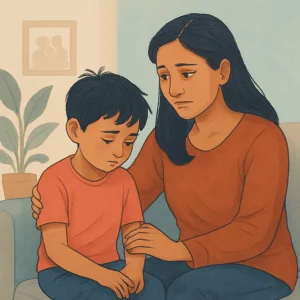Why Forgiveness is Crucial for a Strong Marriage
By Prapoorna M
Last Updated: February 6, 2025
Forgiveness is a fundamental aspect of any successful marriage. It’s about letting go of grudges and resentments, making way for understanding and compassion. In a relationship, it’s inevitable that partners will occasionally hurt each other, whether intentionally or not. That’s where the power of forgiveness comes into play—it helps couples move past these moments and continue building a strong, loving partnership.
Forgiveness in marriage is not just about saying “I’m sorry” or “I forgive you.” It’s a conscious decision to release negative feelings and foster a healthier, more positive environment. This act of letting go is crucial for maintaining a healthy and strong marriage, as it prevents the buildup of bitterness and allows for a deeper emotional connection. By choosing forgiveness, couples can overcome obstacles, grow closer, and build a resilient bond that can withstand the test of time.
Book Your Marriage Counselling Now
Understanding Forgiveness in Marriage
Forgiveness in marriage is more than just a simple apology; it’s a conscious choice to release negative emotions and move forward positively. At its core, forgiveness involves letting go of anger, resentment, and the desire for revenge when a spouse has hurt or wronged you. It’s an essential process that allows couples to heal and maintain a loving relationship despite the inevitable challenges that arise.
In the context of marriage, forgiveness is crucial because it fosters emotional intimacy and trust. It helps partners navigate misunderstandings and conflicts by encouraging open communication and empathy. When you forgive your spouse, you acknowledge their humanity and the reality that everyone makes mistakes. This act of compassion can strengthen your bond, making your relationship more resilient and capable of weathering life’s storms.
It’s important to distinguish between forgiveness and reconciliation, as they are not the same thing. Forgiveness is an internal process; it involves letting go of the hurt and choosing to move on, regardless of whether the other person has apologized or changed their behavior. On the other hand, reconciliation is an external process that involves rebuilding trust and restoring the relationship. While forgiveness can happen independently of reconciliation, the latter often requires both partners to work together to mend the relationship.
For example, a spouse may choose to forgive their partner for a past wrong but decide not to reconcile due to repeated offenses or a lack of genuine remorse. In this case, forgiveness is about finding inner peace and freeing oneself from the burden of anger. However, when both partners are willing to work towards reconciliation, it can lead to a deeper understanding and a renewed commitment to each other.
Comparing Forgiveness and Reconciliation
| Aspect | Forgiveness | Reconciliation |
|---|---|---|
| Definition | The act of letting go of anger, resentment, and thoughts of revenge towards someone who has wronged you. It is an internal process that helps an individual find peace. | The process of restoring a damaged relationship to a state of trust and mutual respect. It involves both partners working together to repair the bond. |
| Process | Can be a personal and individual decision, not necessarily involving the other person. It focuses on the forgiver’s emotional and mental health. | Requires active participation from both partners, involving communication, mutual understanding, and often negotiation to address the issues that caused the rift. |
| Focus | Primarily concerned with achieving personal healing and emotional peace. It is about freeing oneself from the burden of negative emotions. | Concentrated on rebuilding the relationship, restoring trust, and re-establishing a positive and supportive connection between the partners. |
| Outcome | Results in inner peace, emotional release, and a sense of closure for the individual. It does not necessarily lead to reconciliation with the other person. | Leads to renewed commitment, mutual understanding, and a stronger partnership. It often results in a more open and trusting relationship, with improved communication and shared goals. |
The Role of Forgiveness in Strengthening Marital Bonds
Forgiveness in marriage plays a crucial role in overcoming conflicts and misunderstandings. Every relationship faces challenges, and disagreements are a natural part of life together. However, the ability to forgive can transform these conflicts into opportunities for growth and deeper understanding.
When couples practice pardoning in relationships, they acknowledge that both partners are imperfect and capable of making mistakes. This realization fosters empathy and compassion, allowing them to see the situation from their spouse’s perspective. By forgiving, couples can move past the initial hurt and focus on resolving the underlying issues, rather than getting stuck in a cycle of blame and resentment.
One of the key emotional benefits of forgiving your spouse is the release of negative emotions. Holding onto anger and resentment can be emotionally draining and can create a barrier to intimacy. Forgiveness helps in letting go of these harmful feelings, creating space for positive emotions like love, joy, and peace. This emotional release can significantly enhance the quality of the relationship, making it more satisfying and fulfilling.
From a psychological standpoint, forgiveness can improve mental health by reducing stress and anxiety. The act of reconciliation in marriage often involves open communication, which can clarify misunderstandings and prevent future conflicts. This clarity can lead to a more stable and secure emotional environment, where both partners feel understood and valued.
Also Read: The Psychology of Forgiveness in Personal Relationships
Why Forgiveness is Not a Sign of Weakness
Forgiveness in marriage is often misunderstood as a sign of weakness. However, it actually requires significant strength and courage. It takes a strong person to let go of hurt and resentment, especially when they have been wronged. The process of forgiving involves confronting painful emotions and making a conscious decision to move forward positively, which is far from easy.
Choosing to forgive is a powerful act that can greatly strengthen a marriage. It demonstrates a commitment to the relationship and a willingness to prioritize the well-being of both partners over personal grievances. This ability to forgive fosters a supportive and nurturing environment, essential for maintaining a healthy marriage. By forgiving, couples show that they value their relationship more than holding onto past mistakes.
One common misconception is that forgiving someone means condoning bad behavior. However, forgiveness does not excuse or justify harmful actions. It is not about forgetting what happened or allowing it to happen again. Instead, forgiveness is about acknowledging the wrong, addressing it, and then choosing to release the negative emotions associated with it. This distinction is crucial; forgiving someone does not mean that their actions were acceptable, but rather that you are choosing to focus on healing and moving forward.
Forgiveness also involves setting boundaries and making it clear that certain behaviors are unacceptable. It empowers individuals to stand up for themselves while also showing empathy and understanding. In this way, forgiveness can be a protective mechanism, ensuring that both partners feel respected and valued in the relationship.
Practical Steps for Practicing Forgiveness
| Step | Explanation |
|---|---|
| Acknowledge and Express | Recognize and identify your feelings about the situation. Share these emotions with your partner in a calm and non-accusatory manner. This helps both partners understand the depth of the hurt and opens the door for honest dialogue. |
| Communicate Openly | Have a transparent conversation about the issue without assigning blame. Use “I” statements to express how you feel, which can prevent your partner from becoming defensive. This open communication fosters a safe space for both partners to express their perspectives. |
| Take Responsibility | Acknowledge your own role in the situation and apologize sincerely for any hurtful actions or words. Taking responsibility shows maturity and a willingness to improve, which can help repair trust in the relationship. |
| Practice Empathy | Make an effort to understand and appreciate your partner’s feelings and viewpoint. Empathy involves putting yourself in their shoes and recognizing why they may have acted a certain way. This understanding can lead to greater compassion and a stronger bond. |
| Let Go of Resentment | Consciously choose to release any lingering anger or resentment. Focus on the positive aspects of your marriage and the strengths of your partner. Letting go of these negative emotions is essential for moving forward and building a healthier relationship. |
Overcoming Challenges in Forgiving Your Spouse
Why is forgiveness important in a marriage?
Forgiveness is vital in marriage because it allows couples to heal from past hurts and continue building a strong and loving partnership. Without forgiveness, unresolved grievances can fester and create a toxic environment, making it difficult to maintain a healthy relationship.
How does forgiveness impact a marriage?
Forgiveness positively impacts marriage by fostering emotional intimacy, building trust, and promoting a supportive atmosphere. It helps couples navigate conflicts and misunderstandings, making it easier to work through challenges together.
However, forgiving your spouse can sometimes be challenging. Common obstacles to forgiveness include holding onto grudges, fear of vulnerability, and the perception that forgiving means condoning bad behavior. These challenges can create barriers to moving forward and hinder the healing process.
Addressing Common Obstacles to Forgiveness
- Holding Onto Grudges
- Grudges can act as a protective mechanism, preventing further hurt but also keeping you stuck in the past. Holding onto resentment can lead to bitterness, which can poison the relationship over time. To overcome this, it’s essential to acknowledge your feelings and the harm caused. Then, consciously decide to let go of these negative emotions for your well-being and the health of your marriage.
- Fear of Vulnerability
- Forgiving someone requires vulnerability, as it involves exposing your hurt and potentially opening yourself up to being hurt again. This fear can make it difficult to forgive. However, vulnerability is also a key component of intimacy. Recognize that showing vulnerability can strengthen your connection with your spouse and pave the way for deeper understanding and trust.
- Misconception That Forgiving Condones Bad Behavior
- It’s important to differentiate between forgiving and excusing. Forgiveness does not mean that the behavior was acceptable or that you must tolerate it in the future. It’s about freeing yourself from the burden of anger and resentment. Set clear boundaries and communicate your expectations to prevent similar issues from arising.
Tips to Overcome These Challenges
- Reflect on the Benefits of Forgiveness: Consider how forgiveness can positively impact your emotional well-being and your relationship. Focus on the potential for growth and a stronger bond with your spouse.
- Communicate Your Feelings: Have open and honest conversations with your spouse about your feelings. Expressing your hurt can help you process your emotions and move towards forgiveness.
- Seek Support: Sometimes, discussing your feelings with a trusted friend, counselor, or therapist can provide valuable insights and help you work through your emotions. Wellness Hub offers resources and counseling services that can assist couples in navigating the forgiveness process.
- Practice Self-Compassion: Forgiveness is a journey that takes time. Be patient with yourself and recognize that it’s okay to struggle with forgiveness. Give yourself grace as you work through your feelings.
- Focus on Positive Aspects of the Relationship: Remind yourself of the good times and the positive qualities of your spouse. This can help balance your perspective and make it easier to let go of negative feelings.
Know more about Strengthen Your Relationship: Benefits of Marriage Counseling
Subtle Integration of Wellness Hub
Navigating the journey of forgiveness and building a strong relationship can be challenging. Couples seeking guidance and support can benefit from professional resources and expert advice. Wellness Hub offers a range of services designed to help couples understand and practice forgiveness, enhance their communication skills, and strengthen their relationship.
At Wellness Hub, couples can explore various counseling and therapy options tailored to their unique needs. These services include relationship counseling and individual therapy sessions, which provide a safe space to address specific concerns, work through conflicts, and develop healthier relationship patterns. The experienced therapists at Wellness Hub can guide couples through the forgiveness process, offering practical tools and strategies to foster a more compassionate and understanding partnership.
Conclusion
Forgiveness is key to a strong marriage. It helps couples solve conflicts, grow closer, and support each other. It’s not about excusing bad behavior, but about moving forward with compassion. Practicing forgiveness involves recognizing feelings, talking openly, accepting responsibility, and releasing bitterness. Remember, forgiveness is ongoing and crucial as you both evolve. If it’s tough, Wellness Hub’s counseling services can help.
Frequently Asked Questions:
1. Why is forgiveness important in a marriage?
Forgiveness is essential in marriage because it helps couples overcome conflicts, heal from past hurts, and build a strong, supportive relationship. It allows partners to let go of resentment and move forward with compassion and understanding.
2. How does forgiveness impact a marriage?
Forgiveness positively impacts a marriage by fostering emotional intimacy, building trust, and creating a healthier environment. It helps couples navigate disagreements and prevents the accumulation of negative feelings that can harm the relationship.
3. What are the steps to practice forgiveness in marriage?
The steps to practice forgiveness in marriage include acknowledging and expressing feelings, communicating openly and honestly, taking responsibility and apologizing sincerely, practicing empathy, and letting go of resentment. These actions help to strengthen the relationship and promote healing.
4. Is forgiveness a sign of weakness in a marriage?
No, forgiveness is not a sign of weakness. It requires strength and courage to forgive, as it involves letting go of negative emotions and choosing to move forward positively. Forgiveness shows a commitment to the relationship and a willingness to prioritize mutual growth.
5. Can forgiveness in marriage be a continuous process?
Yes, forgiveness is a continuous process in marriage. As couples face new challenges and misunderstandings, they may need to forgive each other repeatedly. Continuous forgiveness helps maintain a healthy and resilient relationship.
6. What are common obstacles to forgiving your spouse?
Common obstacles to forgiving your spouse include holding onto grudges, fear of vulnerability, and the misconception that forgiving condones bad behavior. Overcoming these challenges requires open communication, empathy, and a commitment to letting go of negative feelings.
7. How can couples overcome the challenges of forgiveness in marriage?
Couples can overcome challenges by reflecting on the benefits of forgiveness, communicating their feelings, seeking support from professionals or trusted individuals, practicing self-compassion, and focusing on the positive aspects of their relationship.
8. Where can couples seek help if they’re struggling with forgiveness?
Couples struggling with forgiveness can seek help from professional counseling and therapy services, like those offered by Wellness Hub. These services provide guidance and support to help couples navigate the complexities of forgiveness and strengthen their relationship.
9. Does forgiveness mean forgetting the wrongs in a marriage?
Forgiveness does not mean forgetting the wrongs. It means acknowledging the hurt, addressing it, and choosing not to let it negatively impact the relationship. It involves setting boundaries and moving forward with a focus on healing and growth.
10. How does mutual understanding play a role in the forgiveness process?
Mutual understanding is crucial in the forgiveness process, as it helps partners see each other’s perspectives and fosters empathy. This understanding strengthens the emotional bond and makes it easier to work through conflicts and misunderstandings together.
About the Author:
Prapoorna Mangalampalli
M.Sc., M.A., (Dual Masters in Psychology & English) – Counselor (6+ years of experience)
Prapoorna is a skilled counselor with dual Master’s degrees in Psychology and English. With more than six years of professional experience, she specializes in providing various types of counseling, including online Therapy , Marital , Relationship, child, family, and career counseling. Prapoorna is part of the Wellness Hub team, where she contributes significantly to their mission. She values a team-based approach and is committed to innovation, compassion, and the success of her clients. Her diverse educational background and extensive experience enable her to offer insightful and effective counseling services that positively impact individuals and families.
Book your Free Consultation Today
Parent/Caregiver Info:
Client’s Details:
* Error Message








